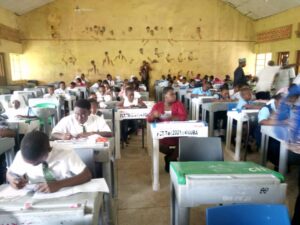
By Omowumi Samuel
The Federal government says it will henceforth ban children below 11 years from participating in the common entrance examination.
The Permanent Secretary in the Ministry of Education, David Adejo, stated this while monitoring the examination along with the Registrar, National Examination Council (NECO), Prof. Ibrahim Wushishi in Abuja on Saturday.
He expressed displeasure at the act, stating that parents were killing children by allowing underage to write National Common Entrance Examination (NCEE).
Going forward, Adejo added that the government’s effort’s in getting more girls in the school was yielding results as over 38,000 girls of the total 72,821 registered for the examination.
The Permanent Secretary, however, said that some underage children were discovered to have participated in the examination, an act which he said was not good for their development.
Adejo said: ”We are moving to education that is reliant on reading textbooks in passing exams, we are getting to a stage where education is what you will use your knowledge to do for the society.
”So you put a small child to go through all the rigorous exercise, by the time he finishes secondary school getting to the university he becomes a problem.
”Parents should please let our children get to the appropriate age before writing this exams and we are going to make sure NECO put in place appropriate checks.
”We need to get the children to present their birth certificate before registration process so that at our own end we are able to curb some of these excesses.
”To get to a secondary school, you should minimally be 12 years and less than 11 years is unacceptable,” he noted.
Meanwhile, the NECO Registrar, Prof. Ibrahim Wushishi, lauded the progress made so far in the area of registration from the northern states compared to the previous years.
”Lagos State has the largest enrollment and the least State is Kebbi state.
”As part of the proactive measure being considered, we are intensifying sensitisation as well as reiterating the importance of the exam.
”We are also ensuring we keep to deadline of registration to avoid the problem of upsurge in registration.
Primary and secondary school education is compulsory for every Nigerian child. As a country, our children must hold this certificate, to be useful both within and outside the country,” he noted.
He added that proactive measures are properly being considered in ensuring adequate sensitization of various stakeholders involved, on the importance of the exam and also address the issue of deadline.
Error: Contact form not found.


